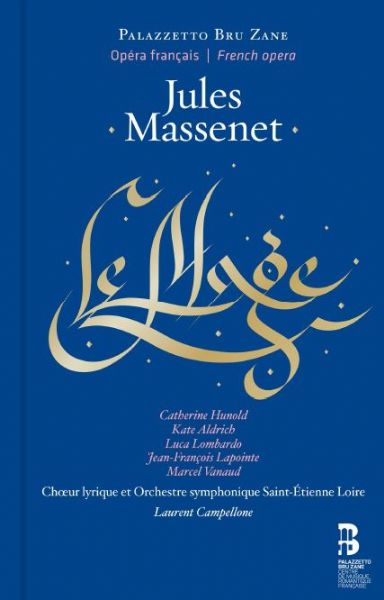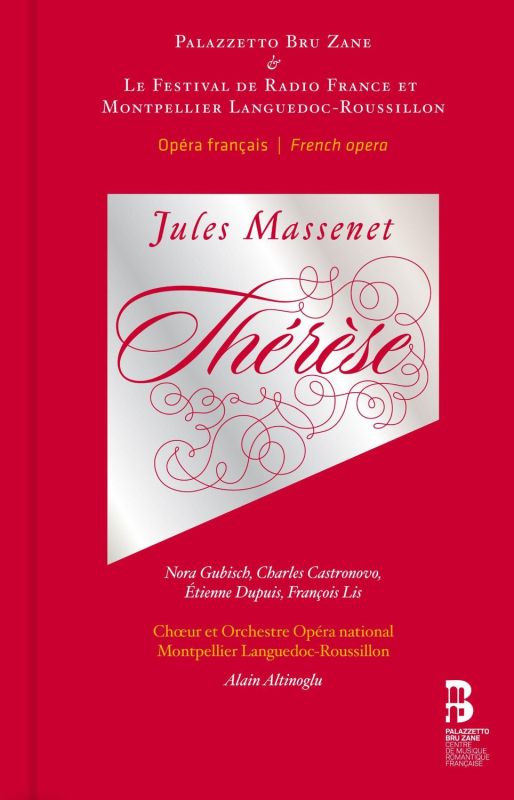MASSENET Le Mage. Thérèse
Two lavishly contextualised Massenet discoveries from Ediciones Singulares
View record and artist detailsRecord and Artist Details
Composer or Director: Jules (Emile Frédéric) Massenet
Genre:
Opera
Label: Ediciones Singulares
Magazine Review Date: 10/2013
Media Format: Digital Versatile Disc
Media Runtime: 138
Mastering:
DDD
Catalogue Number: ES1013

Tracks:
| Composition | Artist Credit |
|---|---|
| (Le) Mage |
Jules (Emile Frédéric) Massenet, Composer
Catherine Hunold, Anahita, Soprano Florian Sempey, Touranien chief; Herald, Baritone Jean-François Lapointe, Amrou, Baritone Jules (Emile Frédéric) Massenet, Composer Julien Dran, Touranien prisoner; Iranian Chief, Tenor Kate Aldrich, Varedha, Mezzo soprano Laurent Campellone, Conductor Luca Lombardo, Zarastra, Tenor Marcel Vanaud, The King of Iran, Baritone Saint-Etienne Lyric Chorus Saint-Etienne Symphony Orchestra |
Composer or Director: Jules (Emile Frédéric) Massenet
Genre:
Opera
Label: Ediciones Singulares
Magazine Review Date: 10/2013
Media Format: CD or Download
Media Runtime: 70
Mastering:
DDD
Catalogue Number: ES1011

Tracks:
| Composition | Artist Credit |
|---|---|
| Thérèse |
Jules (Emile Frédéric) Massenet, Composer
Alain Altinoglu, Conductor Charles Bonner, A voice Charles Castronovo, Armand de Clerval Étienne Dupuis, André Thorel François Lis, Morel Jules (Emile Frédéric) Massenet, Composer Montpellier Languedoc-Roussillon National Choir Montpellier Languedoc-Roussillon National Orchestra Nora Gubisch, Therese Patrick Bolleire, An Officer Yves Saelens, An Officer |
Author: Richard Lawrence
Le mage was staged at the Paris Opéra in 1891. With a run of more than 30 performances between March and October, it was the kind of failure that any modern composer would welcome. But interest lapsed after a revival at The Hague in 1896, and this is the opera’s first recording. With the hero as a general and the heroine an enemy queen as two-thirds of a love triangle, the similarity to Aida is evident. And although the dramatic situation is different, the scene for Varedha and Amrou in Act 2 is very reminiscent of the duet for Aida and Amonasro. I would add that Zarâstra’s epiphany in Act 3 is a rip-off of ‘Arrêtez, ô mes frères’ in Samson et Dalila, were it not that Le mage was composed in 1889 and Saint-Saëns’s opera didn’t reach France till 1890 (but perhaps Massenet had studied the score?).
That said, Le mage is well worth hearing. The orchestra plays excellently for Laurent Campellone, who whips up the passion where required but relishes the more sentimental passages too. Catherine Hunold, Kate Aldrich and Jean-François Lapointe give it their all; the disappointment is Luca Lombardo, with his uningratiating tone and wooden phrasing.
Thérèse (Monte Carlo, 1907) is another love triangle; but instead of Bactria, c2500BC, we are near Versailles, then in Paris, at the height of the Terror (Massenet quotes the Marseillaise at one point). Thérèse and her husband André shelter the aristocratic Armand from the revolutionaries. The two men are childhood friends but, unbeknown to André, his wife and Armand are former lovers. After much vacillation (and significant veering from ‘vous’ to ‘tu’ and back) Thérèse agrees to flee with Armand, but finally chooses to join André on the guillotine.
There are echoes of Manon (the chorus of soldiers) and Werther (Armand’s arrival). The scale is small, the plot thin, but the opera has its moments: one of them is the flowing ‘O Thérèse, regarde’, sensitively phrased by Etienne Dupuis. Nora Gubisch and Charles Castronovo are splendid and the Montpellier forces under Alain Altinoglu are a match for their colleagues in Saint-Etienne. The discs come in the pockets of handsome hardbacks containing articles and librettos in French and English.
Discover the world's largest classical music catalogue with Presto Music.

Gramophone Digital Club
- Digital Edition
- Digital Archive
- Reviews Database
- Full website access
From £8.75 / month
Subscribe
Gramophone Full Club
- Print Edition
- Digital Edition
- Digital Archive
- Reviews Database
- Full website access
From £11.00 / month
Subscribe
If you are a library, university or other organisation that would be interested in an institutional subscription to Gramophone please click here for further information.




